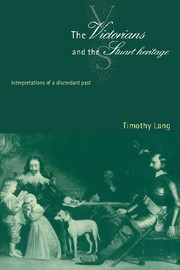Book contents
- Frontmatter
- Contents
- Preface
- Acknowledgments
- Introduction
- 1 Henry Hallam and early nineteenth-century Whiggism
- 2 Thomas Babington Macaulay and Victorian religious controversy
- 3 Puritanism and the ideology of Dissent
- 4 Samuel Rawson Gardiner and the search for national consensus
- 5 Cromwell and the late Victorians
- Epilogue
- Index
4 - Samuel Rawson Gardiner and the search for national consensus
Published online by Cambridge University Press: 06 October 2009
- Frontmatter
- Contents
- Preface
- Acknowledgments
- Introduction
- 1 Henry Hallam and early nineteenth-century Whiggism
- 2 Thomas Babington Macaulay and Victorian religious controversy
- 3 Puritanism and the ideology of Dissent
- 4 Samuel Rawson Gardiner and the search for national consensus
- 5 Cromwell and the late Victorians
- Epilogue
- Index
Summary
In an essay on Macaulay, Lytton Strachey once identified those “qualities” that he thought essential for the successful historian: “a capacity for absorbing facts, a capacity for stating them, and a point of view. The two latter,” Strachey went on, “are connected, but not necessarily inseparable. The late Professor Samuel Gardiner, for instance, could absorb facts, and he could state them; but he had no point of view; and the result is that his book on the most exciting period of English history resembles nothing so much as a very large heap of sawdust.”
When he aimed his sarcasm at Samuel Rawson Gardiner, Strachey was ridiculing one of the most important English historians of the nineteenth century, and the body of work that he reduced to “sawdust” was in fact the most sustained effort by any Victorian to come to grips with the complexities of the Stuart past. From the mid-1850s, when he came to London, having just taken his degree at Oxford, until his debilitating stroke in 1901, Gardiner worked diligently to compile a narrative history of England from the accession of James I to the Restoration of the Stuarts. Although this story had been told before, Gardiner sensed that it had not been told with candor, and to guarantee his own accuracy he based his account on a thorough reading of the evidence. Experience had taught him “that no quotations are sufficient to save an honest inquirer from the trouble of looking into the original documents.”
- Type
- Chapter
- Information
- The Victorians and the Stuart HeritageInterpretations of a Discordant Past, pp. 139 - 183Publisher: Cambridge University PressPrint publication year: 1995



